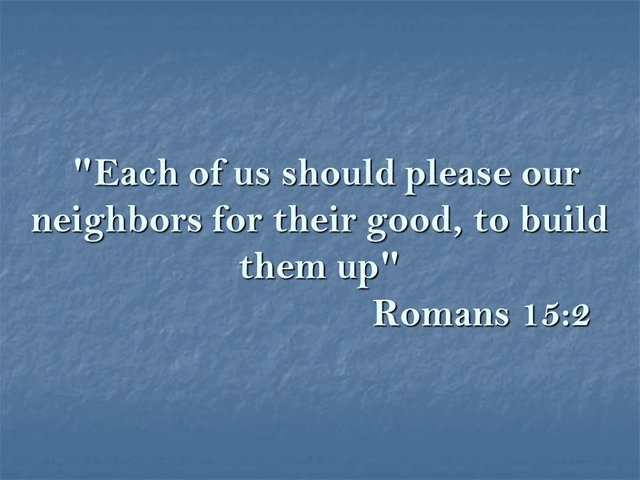Paul teach to us the spiritual meaning of concord and communion: "Each of us should please our neighbors for their good, to build them up" Romans 15:2. According to Aristotle friendship between people can be for utility, for pleasure or for goodness or virtue.
In the first two forms of friendship the friend is a means to achieve other goals, in the last form of friendship the friend is a goal by itself. The Bible reminds us that our neighbor is the one who needs our help. Our neighbor is not necessarily our friend, nor is the inverse, that is, the friend could not be our neighbor.
But when we live mercy, kindness predisposes us to treat the other as a neighbor and that benevolence is the basis of genuine friendship, the benevolent is a friend. The benevolent is a brother. Mercy is a goal by itself and not a means to achieve other goals. Remember not every friend is benevolent.

So when Paul talks to us about pleasing our neighbor, he talks about the bond of true mercy that unites men and that is lived in a reciprocal way, that is, each person expects retribution for his mercy. Mercy is defined as amability, affability, compassion, benevolence, benedicence. The mercy is expansive, progressive, edifying.
The kingdom of God is the empire, government of mercy among men and this is the base of communion between men. The communion is a special form of friendship, is political friendship also known as concord, that is the friendship between men as members of the community. The concord is the union of hearts and mind, and this concord is resumed in an idea: "We are all one"; "that all of them may be one Father, just as you are in me and I am in you", John 17:21.
The bible describes the concord and the communion: "All the believers were one in heart and mind. No one claimed that any of their possessions was their own, but they shared everything they had" Acts 4:3
For more information, visit my profile, follow the link and download for free my ebook.